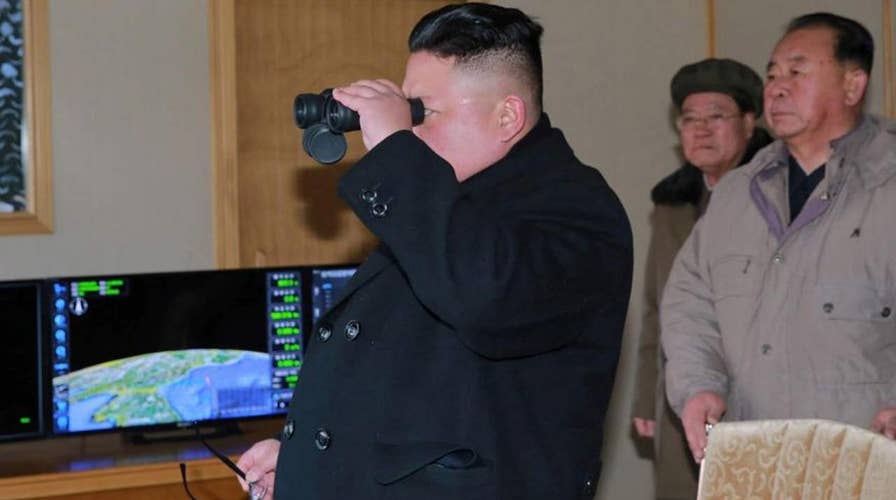US waging secret effort against North Korea missile program
Insight from New York Times national security correspondent David Sanger
A senior Chinese diplomat said Wednesday that tensions on the Korean peninsula were like "two accelerating trains" headed for collision, saying the way to defuse the crisis required action from both sides.
Foreign Minister Wang Yi proposed that North Korea could suspend its nuclear and missile activities in exchange for a halt in joint military drills conducted by the U.S. and South Korea.
THAAD DEPLOYMENT THREAT STOKES TENSIONS WITH BEIJING, MOSCOW
He described escalating tensions between the North and Washington and Seoul to "two accelerating trains, coming toward each other with neither side willing to give way."
"The question is: Are the two sides really ready for a head-on collision?" Wang told reporters. "Our priority now is to flash the red light and apply the brakes on both trains."
VIDEO: PENTAGON WAGING SECRET EFFORT AGAINST NORTH KOREA MISSILE PROGRAM
In a briefing with reporters, Wang said China proposes that as a first step to defusing the looming crisis, the North might suspend its nuclear and missile activities if the U.S. and South Korea halted their military exercises.
"This suspension-for-suspension can help us break out of the security dilemma and bring the parties back to the negotiating table," Wang said, describing the approach as trying to address all parties' concerns in a "synchronized and reciprocal" manner.
China has been stepping up pressure on North Korea, its once-close Communist ally, to give up its nuclear and ballistic missile programs. Last month, Beijing suspended all coal imports from North Korea for the rest of the year.
China is North Korea's largest source of trade and aid, and the move deprives the North of an important source of foreign currency. Beijing wants the U.S. in return to restart long-stalled negotiations with North Korea to ease regional tensions.
A White House official downplayed Wang's suggestion, saying China has made similar proposals in the past. The official was not authorized to discuss the policy publicly and spoke on condition of anonymity.
Wang, who answered a range of questions at a briefing on the sidelines of China's annual national legislative sessions, also urged South Korea to suspend deployment of a U.S. anti-missile system.
Wang called the deployment a "wrong choice," saying it is the biggest problem hurting relations between Beijing and Seoul. On Tuesday, U.S. missile launchers and other equipment needed for the system arrived in South Korea.
Washington and Seoul say the system is defensive and not meant to be a threat to Beijing or Moscow. The U.S. military said THAAD can intercept and destroy short and medium-range ballistic missiles during the last part of their flights. China is opposed to the system, saying it would allow U.S. radar to peer deep into its territory and monitor its flights and missile launches.
"We urge some forces in South Korea not to keep insisting on taking this path, otherwise the result can only be damage to others and harm to yourself," Wang said.
On Tuesday, China's foreign ministry said Beijing will take "necessary measures" to protect itself against the deployment of the system and warned that the U.S. and South Korea should be prepared to bear the consequences.
Asked about the state of China's relations with the U.S. under President Donald Trump, Wang said the two countries' ties were transitioning steadily.
Wang said China and the U.S. could become "excellent partners" if they had mutual respect and did not seek conflict with each other. He said the two sides should not seek to build one's success at the expense of the other and get past the differences in their political systems.
"The Chinese people have great confidence in our own social system and path," Wang said, referring to the country's authoritarian system of one-party rule. "And we welcome efforts to build a better United States."
Relations between the world's two largest economies have faced new uncertainties posed by Trump's accusations that China cheats at trade and his threats to raise import tariffs. Trump has also criticized China's activities in the South China Sea.
Washington's pursuit of an "America first" foreign policy is raising questions about whether China would be trying to fill the void if the U.S. relinquishes its traditional global leadership role.
Wang said Beijing did not seek such a role and instead wanted to shoulder greater responsibility.
"China believes in the equality of all countries, large and small, and we don't believe some countries should lead others," he said.
